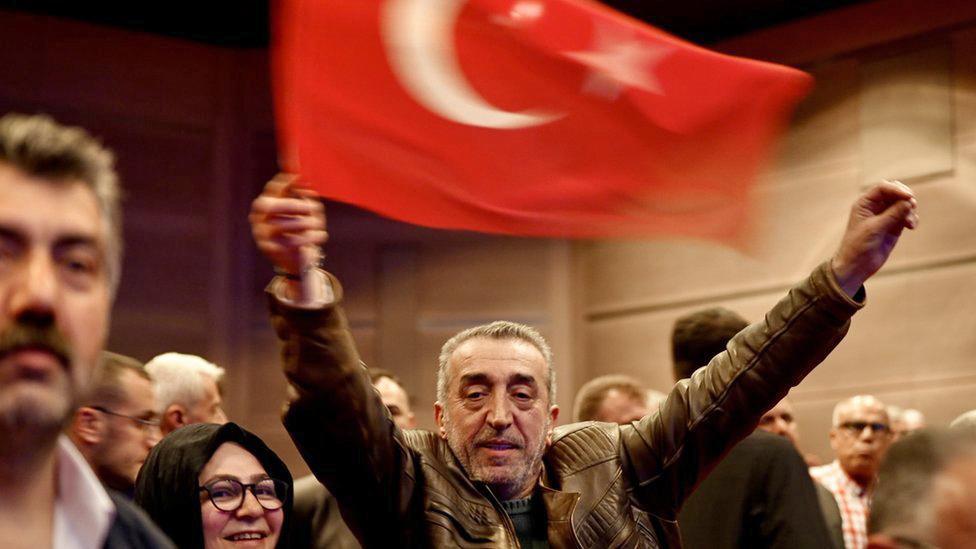Turkish election: Erdogan and Kemal Kilicdaroglu clash in final push for votes
- Published
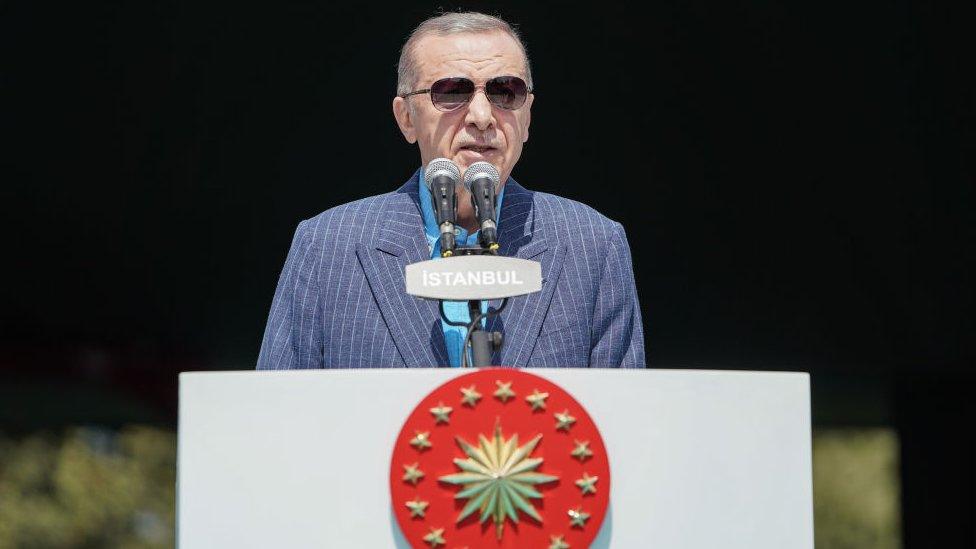
President Erdogan's last big campaign event reminded voters that he had faced down a coup
The last hours of Turkey's presidential race have turned increasingly sour as Recep Tayyip Erdogan bids to extend his 20 years in power by five more.
Ahead of Sunday's run-off vote, opposition rival Kemal Kilicdaroglu has courted nationalist votes by vowing to expel millions of Syrian refugees.
The president accused him of hate speech - and said a Kilicdaroglu victory would be a win for terrorists.
The opposition candidate trailed in the first round by 2.5 million votes.
The president is favourite, but his rival believes the margin could still be bridged - either by the 2.8 million supporters of an ultranationalist candidate who came third or by the eight million voters who did not turn out in the first round.
Before their campaigns drew to a close on Saturday evening, Mr Erdogan marked the anniversary of a 1960 coup with a visit to the mausoleum of an executed prime minister.
It was a reminder to voters that in 2016 he had faced down an attempted coup, and that the government would be safe in his hands.
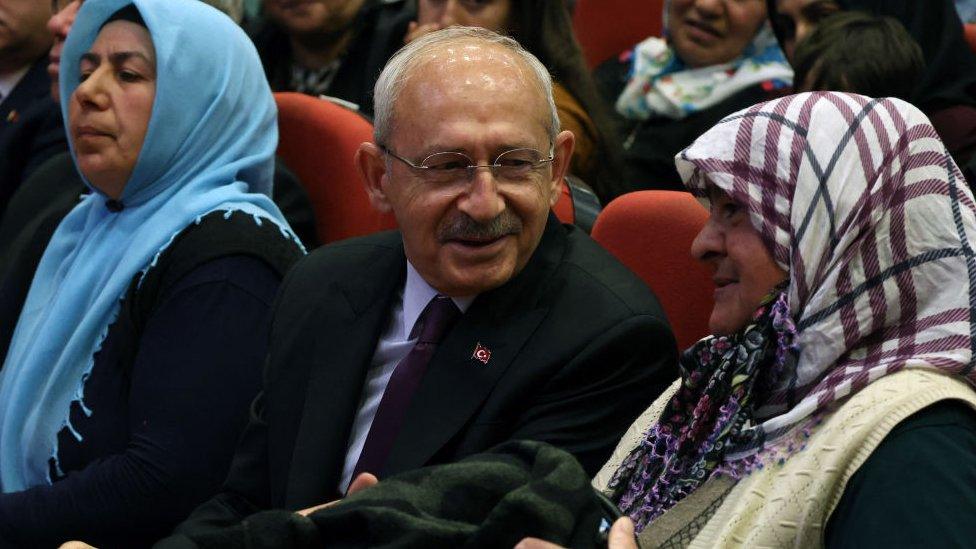
Mr Kilicdaroglu sympathised with women hit by the economic crisis as the campaign drew to a close
His rival met a group of women hit by Turkey's economic crisis, promising that, if elected, he would live modestly, rather than in a presidential palace.
For many hours this week Mr Kilicdaroglu took audience questions on a YouTube channel called BaBaLa TV. The broadcast has reached 24 million views by the latest count and Turkey has a population of 85 million.
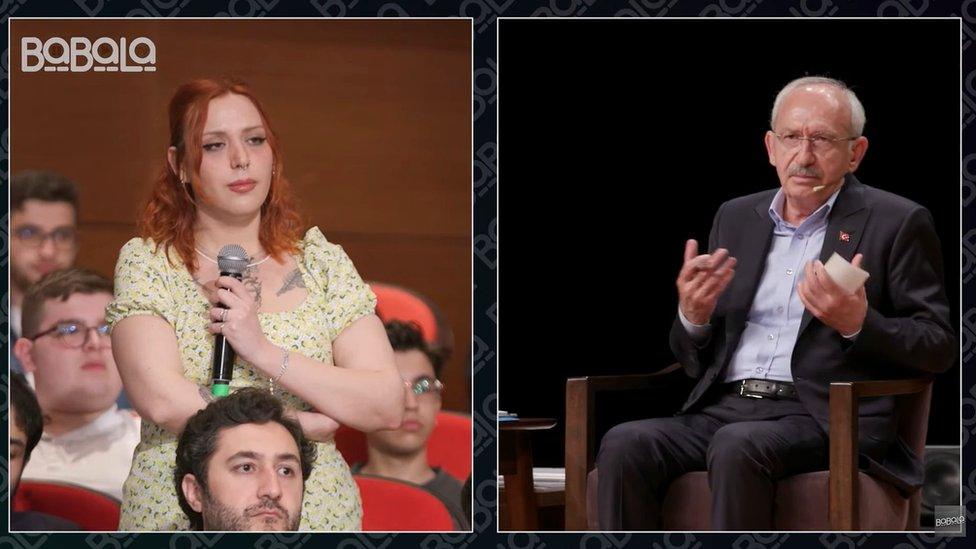
Youth campaigner Mehtep thinks the YouTube marathon could work: "Being on BaBaLa TV affected lots of young voters who didn't vote first time around."
She's a member of the centre-right, nationalist Good party, which has backed the opposition challenger and has the only female leader in Turkish politics in Meral Aksener.
The appearance was a smart move for a candidate trying to overcome his rival's inbuilt advantage of controlling about 90% of Turkish media.
International monitors say voters may have had a genuine choice, but that Turkey "did not fulfil the basic principles for holding a democratic election", external.
President Erdogan has not just amassed sweeping powers in the past six years - he has cracked down on dissent and political opponents have been thrown into jail.
Anticipating an Erdogan victory and further economic instability, the financial markets reacted with the Turkish lira hitting record lows against the dollar on Friday. Demand for foreign currency has surged and the central bank's net foreign currency reserves have slipped into negative territory for the first time since 2002.
That will be of little concern in the town of Bala, an hour's drive to the south-east of Ankara.
More than 60% of voters backed President Erdogan there two weeks ago, although all the main parties have offices on the the high street.
Across the road from the president's party headquarters, doner kebab shop owner Al Ozdemir says he will vote for another five years of Mr Erdogan.
But another shopkeeper refused to tell the BBC who he supported because he feared losing Erdogan supporters as customers.
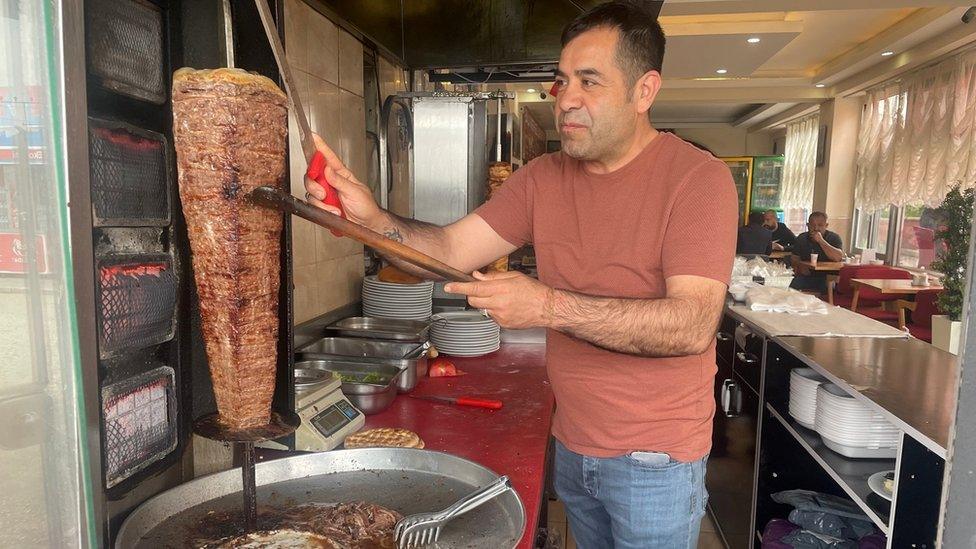
Kebab shop owner Al Ozdemir is a loyal Erdogan supporter in Bala
For months Turkey's struggling economy was the number one issue, but as Sunday's run-off has drawn close, the rhetoric has intensified and refugees are at the centre of it.
Gone is the unifying 74-year-old opposition leader with his hands cupped into trademark heart-shape. Instead, he is trying to attract voters who backed ultranationalist leader Sinan Ogan two Sundays ago.
Although the president won Mr Ogan's backing, the opposition leader secured the support of the anti-immigrant Victory Party, led by Umit Ozdag, whose party won 1.2 million votes.
The Victory Party leader said this week Mr Kilicdaroglu had agreed to send back "13 million migrants" within a year "in line with international law".
Turkey is hosting more refugees than any other country, but nowhere near that many.
Prof Murat Erdogan (no relation to President Erdogan), who conducts a regular field study called Syrians Barometer, believes the total number of Syrian refugees and irregular migrants from Iran, Iraq, Afghanistan and Pakistan is closer to six or seven million.
"Their discourse is not realistic, physically it's impossible," says Prof Erdogan. "If we talk about [repatriating] voluntarily it's not feasible, and by force it means per day more than 50,000 should be sent back."
The rhetoric is unpleasant but it might make a difference. As many as 85% of Turks want refugees from Syria's civil war to go home, opinion polls suggest.
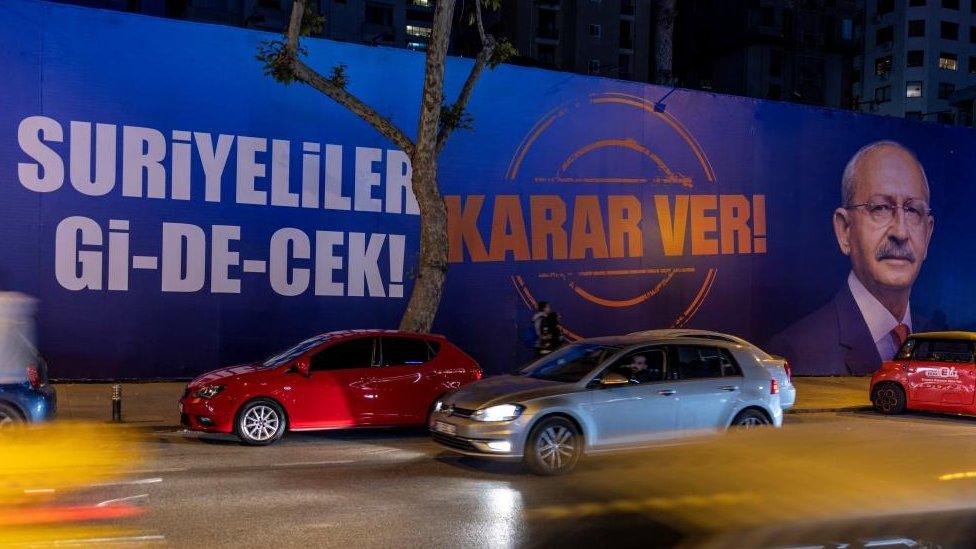
This Kilicdaroglu poster in Istanbul reads: "Syrians will go! Make a decision!"
Both sides have nationalist parties to keep onside, says political scientist Nezih Onur Kuru from Koc university, and Mr Kilicdaroglu is tapping into security concerns felt by many voters, especially young ones.
"He knows the level of perceived threats is too high because of the immigrant crisis and terrorist attacks and wars involving Russia, Syria and Azerbaijan."
President Erdogan says he is already sending Syrian refugees back and plans to send more. His main partner is the far-right nationalist MHP.
And he has gone on the attack too, using a manipulated video at a rally to link his rival to the Kurdish militant PKK, considered a terror group in the West as well as Turkey.
On Friday he said a Kilicdaroglu victory meant that "terrorist organisations" would win.
His target is the big pro-Kurdish HDP party, which backs Mr Kilicdaroglu and which President Erdogan has repeatedly sought to identify with the PKK militants. The HDP denies any such links.
The HDP, for now, backs Mr Kilicdaroglu because it wants an end to Turkey's "one-man regime". But it has genuine concerns about his alliance with a far-right nationalist.
Initially it was thought that President Erdogan could be defeated because of his disastrous handling of Turkey's economy and his poor response to February's earthquakes.
And yet almost half of voters backed him. The question is whether Mr Kilicdaroglu's change of tack will work.
"I wanted a change, all my customers wanted a change," says Songul in her chicken restaurant in Bala.
But ultimately she says they are all sticking with the president because they do not trust his opposite number: "I'll vote for Erdogan as there's no alternative."
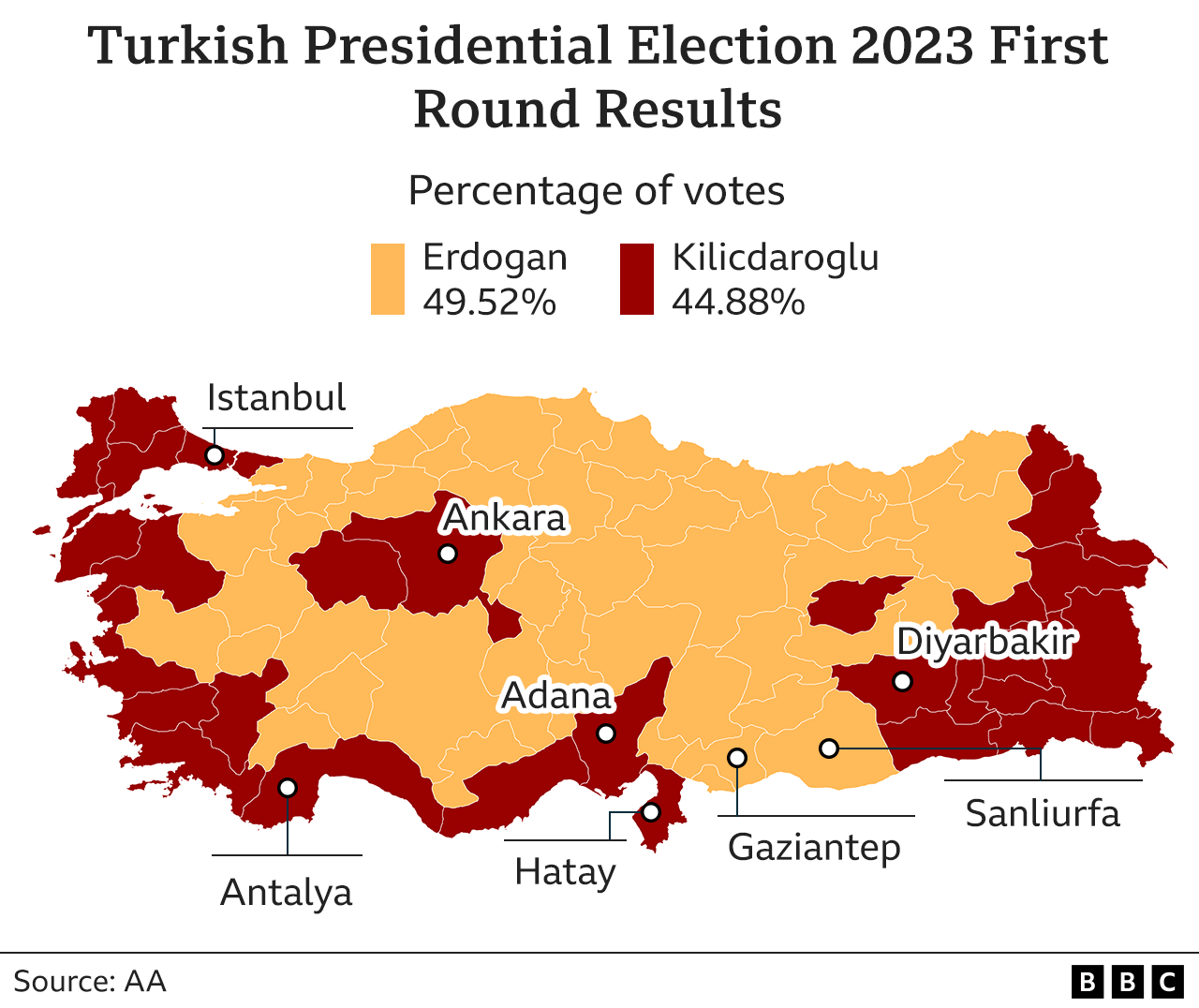

- Published23 May 2023
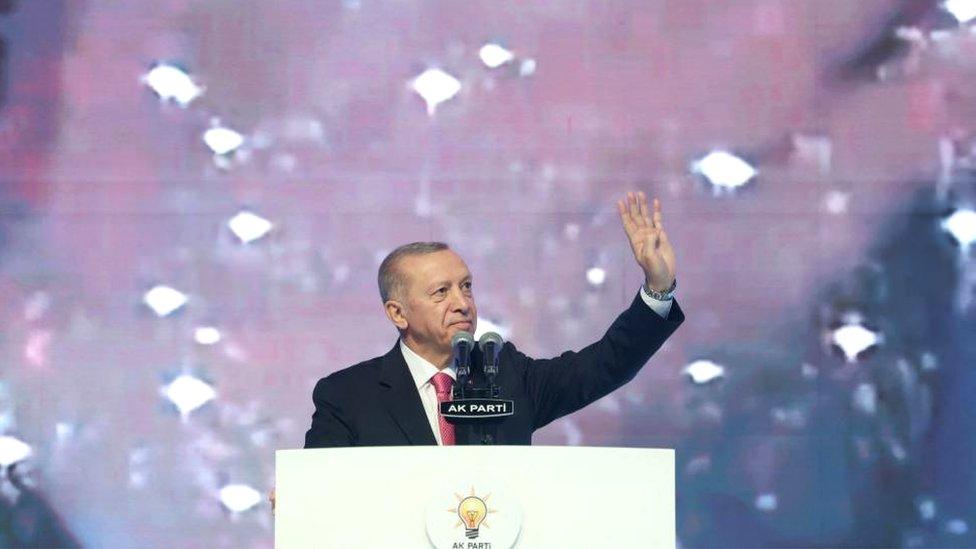
- Published26 May 2023
